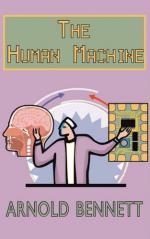All individualities, other than one’s own, are part of one’s environment. The evolutionary process is going on all right, and they are a portion of it. Treat them as inevitable. To assert that they are inevitable is not to assert that they are unalterable. Only the alteration of them is not primarily your affair; it is theirs. Your affair is to use them, as they are, without self-righteousness, blame, or complaint, for the smooth furtherance of your own ends. There is no intention here to rob them of responsibility by depriving them of free-will while saddling you with responsibility as a free agent. As your environment they must be accepted as inevitable, because they are inevitable. But as centres themselves they have their own responsibility: which is not yours. The historic question: ’Have we free-will, or are we the puppets of determinism?’ enters now. As a question it is fascinating and futile. It has never been, and it never will be, settled. The theory of determinism cannot be demolished by argument. But in his heart every man, including the most obstinate supporter of the theory, demolishes it every hour of every day. On the other hand, the theory of free-will can be demolished by ratiocination! So much the worse for ratiocination! If we regard ourselves as free agents, and the personalities surrounding us as the puppets of determinism, we shall have arrived at the working compromise from which the finest results of living can be obtained. The philosophic experience of centuries, if it has proved anything, has proved this. And the man who acts upon it in the common, banal contracts and collisions of the difficult experiment which we call daily life, will speedily become convinced of its practical worth.
XI
AN INTERLUDE
For ten chapters you have stood it, but not without protest. I know the feeling which is in your minds, and which has manifested itself in numerous criticisms of my ideas. That feeling may be briefly translated, perhaps, thus: ’This is all very well, but it isn’t true, not a bit! It’s only a fairy-tale that you have been telling us. Miracles don’t happen,’ etc. I, on my part, have a feeling that unless I take your feeling in hand at once, and firmly deal with it, I had better put my shutters up, for you will have got into the way of regarding me simply as a source of idle amusement. Already I can perceive, from the expressions of some critics, that, so far as they are concerned, I might just as well not have written a word. Therefore at this point I pause, in order to insist once more upon what I began by saying.
The burden of your criticism is: ’Human nature is always the same. I know my faults. But it is useless to tell me about them. I can’t alter them. I was born like that.’ The fatal weakness of this argument is, first, that it is based on a complete falsity; and second, that it puts you in an untenable position. Human nature does change. Nothing can be more unscientific, more hopelessly mediaeval, than to imagine that it does not. It changes like everything else. You can’t see it change. True! But then you can’t see the grass growing—not unless you arise very early.




